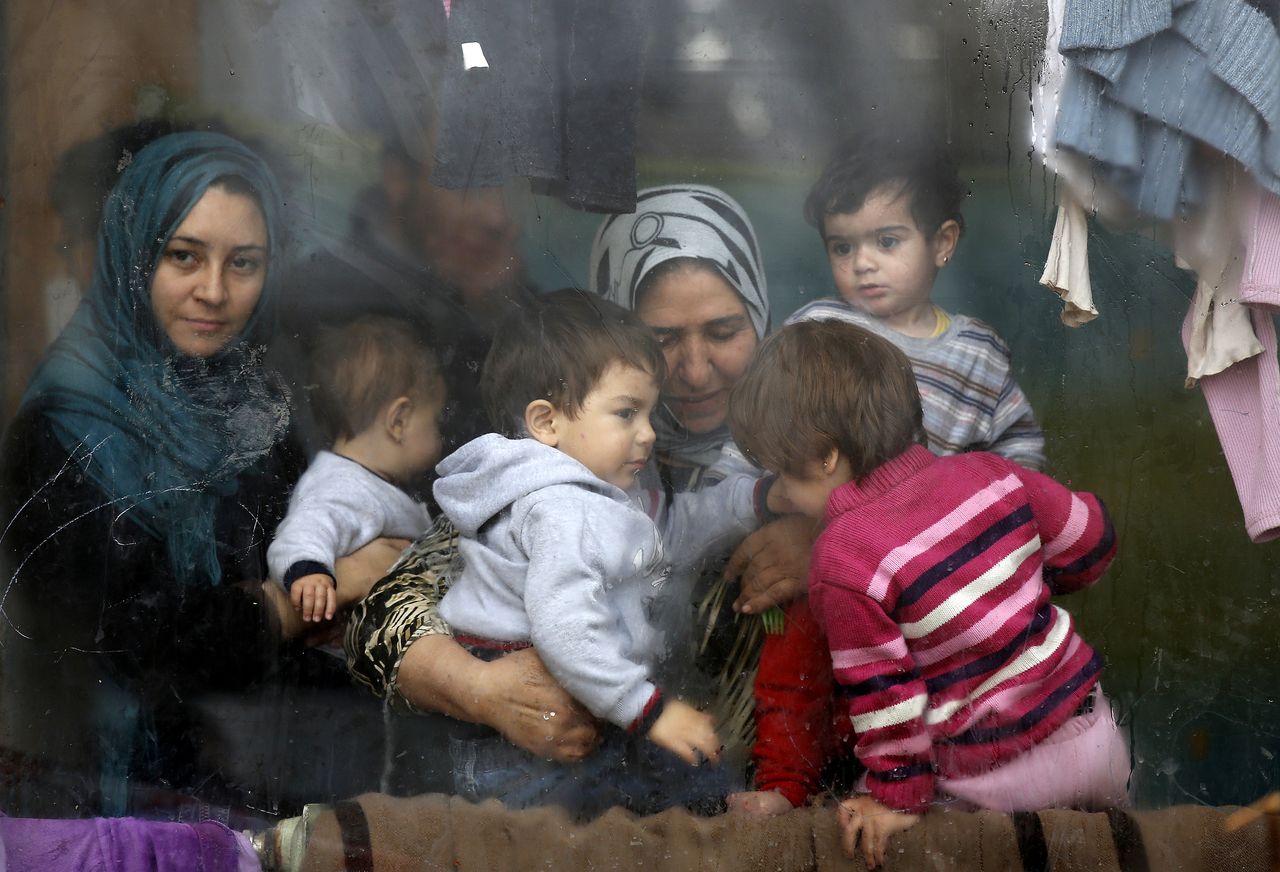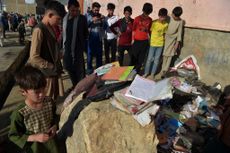America's shameful response to the Syrian refugee crisis
The U.S. and the rest of the industrialized West can do more — much, much more


The word "crisis" is generally used to denote sudden change, a breaking point, the moment at which something that may have once been tolerable becomes insufferable. Europe, we've heard, is suffering a refugee "crisis" — one so big that the Obama administration announced on Thursday that it would help by taking in 10,000 Syrian refugees in fiscal year 2016.
And perhaps Europe is in the middle of a crisis — but the Middle East is suffering not so much a crisis as a rolling cataclysm, a ceaseless churn of bloodshed, destitution, and upheaval that has led millions upon millions to flee their homes. Fully half of Syria's population is on the run from an exceptionally vicious civil war being waged between the savage Assad regime and a shifting array of opposition forces and/or murderous extremists rushing to expand their influence and territory. More than 11 million Syrians have fled their homes in the past four years: 7.6 million are internally displaced persons (IDPs), still inside Syria's borders; the vast majority of the four million who got across those borders are now in Lebanon, Jordan, and Turkey.
The numbers are almost unfathomable. What does more than 11 million people look like? It looks like the entire population of Ohio. It looks like Boston, Detroit, Milwaukee, New York City, and Washington, D.C., rolled into one. In relative terms, Syria's 11 million refugees and IDPs are the equivalent of 155 million Americans fleeing death and chaos, more than half of them children.
Subscribe to The Week
Escape your echo chamber. Get the facts behind the news, plus analysis from multiple perspectives.

Sign up for The Week's Free Newsletters
From our morning news briefing to a weekly Good News Newsletter, get the best of The Week delivered directly to your inbox.
From our morning news briefing to a weekly Good News Newsletter, get the best of The Week delivered directly to your inbox.
Of the the four million or so who have escaped Syria, about 50 percent are being hosted by Turkey. Jordan has taken in 630,000, which, given that country's population of six million, means one out of every 13 people in Jordan today is actually Syrian. Lebanon has absorbed 1.7 million refugees — a number that translates to about one out of five people currently in Lebanon.
To repeat: This has been going on for four years. More than four years, actually, as it all began when Assad turned his armed forces on peaceful protesters in March 2011. Remember the heady days of the Arab Spring, when news out of the Middle East was actually inspiring? The current Syrian horror show is a big chunk of what happened when the news stopped being so inspiring. When the Syrian "Spring" became all-out war and it got so complicated that seemingly no one knew what to do, so most of the West stopped paying attention and an entire nation imploded.
During all that time, the U.S. has taken in 1,434 Syrian refugees; the U.K. a total of 216; and the fabulously wealthy Gulf states have sheltered none.
It's true that the international outcry over the recent drowning death of a Syrian toddler has led to a new willingness to help. Even before Thursday's announcement by the White House, the British government committed to absorbing an additional 20,000 Syrians over the course of five years; European Commission President Jean-Claude Juncker called on European governments to share the load for 160,000; and German Vice Chancellor Sigmar Gabriel told the press that his country could take in half a million refugees annually for "several years."
Which is to say, if all of this actually happens, the efforts by Europe and the United States — with a combined total population of 822 million — would not quite equal those already being made by Jordan.
There are, of course, other complicating factors. Syrians are not the only refugees or economic migrants currently throwing themselves on Europe's mercy; the U.S. is on the cusp of closing a nuclear deal with Iran, one of Assad's greatest supporters; many of the fleeing Syrians are, in fact, Palestinians, and thus twice refugees; and the sheer logistics of getting that many people from point A to point B means that even those who eventually reach safety still have weeks and months of suffering yet to endure. And of course Syria's civil war, with its barrel bombs, starvation tactics, and beheadings, grinds on.
One thing that the industrialized West could do immediately, while we hammer out numbers and quotas and transportation, is to significantly increase support for the organizations already providing humanitarian aid. Just last week, even as the world mourned a single tiny body washed up on the shore, the United Nations' World Food Program (WFP) informed some 200,000 Syrians in Jordan that it would no longer be providing them with food aid.
Speaking with BuzzFeed, the WFP's senior regional communications officer was very clear on what the problem is: "We are facing a huge shortage of funds. We used to support around 100,000 refugees at the camps in Jordan in addition to 461,000 refugees outside the camps, but now with the low amounts of contributions we cannot afford all that." How much money had the WFP been giving families heretofore? About $14 a month.
The complicating factors — the reasons this catastrophe roils on and on — won't be resolved anytime soon. But the international community, and in particular this nation of immigrants, can and must do a great deal more to alleviate the anguish that marks the lives of millions of Syrians every single day.
Our European allies may have suddenly found the consequences of the Syrian civil war to be insufferable, but the Middle East has been buckling under its horrors for years. It's well past time for the West to step up.
Sign up for Today's Best Articles in your inbox
A free daily email with the biggest news stories of the day – and the best features from TheWeek.com
Emily L. Hauser is a long-time commentary writer. Her work has appeared in a variety of outlets, including The Daily Beast, Haaretz, The Forward, Chicago Tribune, and The Dallas Morning News, where she has looked at a wide range of topics, from helmet laws to forgetfulness to the Israeli-Palestinian conflict.
-
 US Christianity's long decline has halted, Pew finds
US Christianity's long decline has halted, Pew findsSpeed Read 62% of Americans call themselves Christian, a population that has been 'relatively stable' for the past five years
By Peter Weber, The Week US Published
-
 Amy Gleason: the low profile Trump insider officially heading DOGE
Amy Gleason: the low profile Trump insider officially heading DOGEIN THE SPOTLIGHT While Elon Musk continues slashing government services as Trump's 'efficiency' pitbull, the White House insists a little-known MAGA functionary is the one officially running DOGE
By Rafi Schwartz, The Week US Published
-
 Trump vows 25% tariffs on EU at Cabinet meeting
Trump vows 25% tariffs on EU at Cabinet meetingSpeed Read The tariff threats serve to enhance a growing suspicion that the president views Europe as an adversary, not an ally
By Peter Weber, The Week US Published
-
 Bombing at girls' school in Kabul kills at least 50, including students
Bombing at girls' school in Kabul kills at least 50, including studentsSpeed Read
By Tim O'Donnell Published
-
 Garland says DOJ is 'pouring its resources' into stopping domestic terrorists 'before they can attack'
Garland says DOJ is 'pouring its resources' into stopping domestic terrorists 'before they can attack'Speed Read
By Catherine Garcia Published
-
 Suspected Israeli cyberattack on Iranian nuclear site complicates U.S.-Iran nuclear deal talks
Suspected Israeli cyberattack on Iranian nuclear site complicates U.S.-Iran nuclear deal talksSpeed Read
By Peter Weber Published
-
 North Korea fires 2 ballistic missiles into sea
North Korea fires 2 ballistic missiles into seaSpeed Read
By Peter Weber Last updated
-
 U.S. airstrikes target Iranian-backed militia facilities in Syria
U.S. airstrikes target Iranian-backed militia facilities in SyriaSpeed Read
By Catherine Garcia Published
-
 Rochester police who killed Daniel Prude during mental health crisis won't face charges
Rochester police who killed Daniel Prude during mental health crisis won't face chargesSpeed Read
By Kathryn Krawczyk Published
-
 Mike Pence's 'nuclear football' was also apparently at risk during the Capitol siege
Mike Pence's 'nuclear football' was also apparently at risk during the Capitol siegeSpeed Read
By Peter Weber Published
-
 Trump publicly attacked Pence during the Capitol riot knowing Pence was in trouble, GOP senator suggests
Trump publicly attacked Pence during the Capitol riot knowing Pence was in trouble, GOP senator suggestsSpeed Read
By Peter Weber Published